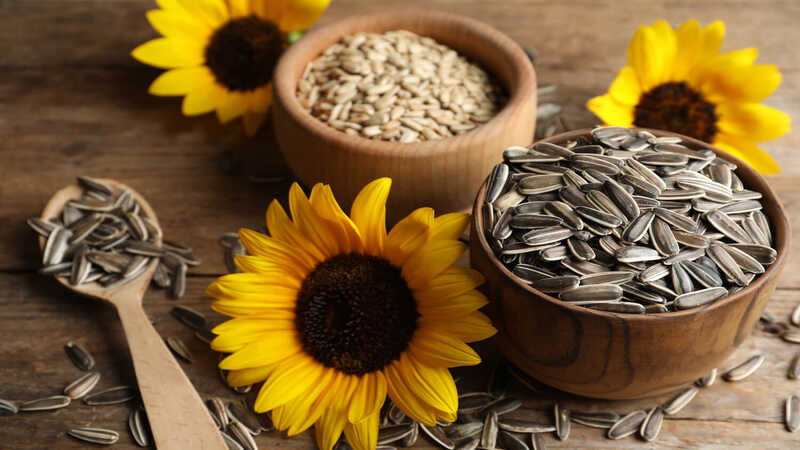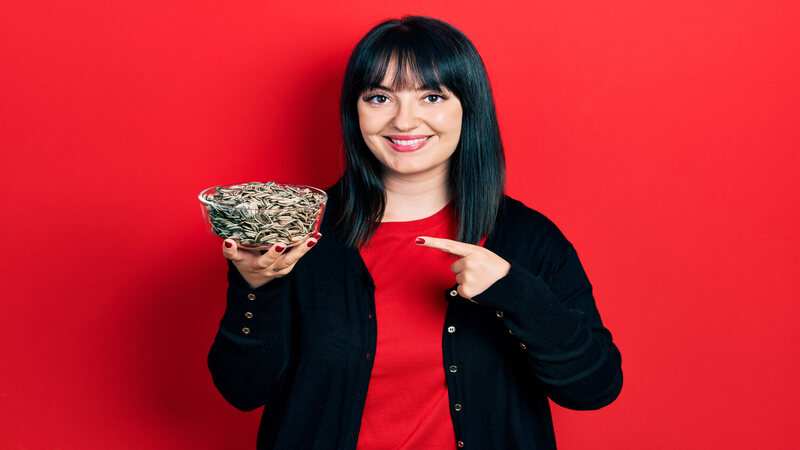
Sunflower seeds are considered one of the superfoods. Not many are aware of this, but sunflower seeds are packed with various essential nutrients. Since this superfood falls under the category of nuts, some might feel that consuming sunflower seeds during pregnancy could be harmful to the baby and the mother.
To break this notion, we list below the health benefits of sunflower seeds and speculate whether it is safe to consume them during pregnancy.
Video: Sunflower Seeds During Pregnancy
Nutritional Value of Sunflower Seeds
Sunflower seeds have a unique nutty flavor and are packed with nutrients. They are also high in calories. In comparison to dry roasted sunflower seeds that contain 186 calories per quarter cup, sunflower seeds roasted in oil contain approximately 200 calories. These calories are largely derived from fat.
Sunflower seeds are a good source of protein. A serving of 1/4 cup sunflower seeds contains almost 6 grams of protein. Vitamin E can be found in abundant amounts in sunflower seeds. T In terms of copper, manganese, phosphorus, magnesium, and selenium, sunflower seeds provide most of the daily recommended allowance.
Health Benefits of Sunflower Seeds in Pregnancy
 Consuming sunflower seeds is associated with a number of health benefits, such as a reduction in your risk of diseases such as high blood pressure or heart disease. Moreover, they contain nutrients that strengthen your immune system and give you more energy. They are therefore extremely beneficial during pregnancy.
Consuming sunflower seeds is associated with a number of health benefits, such as a reduction in your risk of diseases such as high blood pressure or heart disease. Moreover, they contain nutrients that strengthen your immune system and give you more energy. They are therefore extremely beneficial during pregnancy.
Here are some amazing benefits of eating sunflower seeds while pregnant:
1. Helps to Prevent Cancer
Cancer is mainly caused by uncontrolled oxidation that takes place in the body. Sunflower seeds act as antioxidants and help to prevent oxidation, hence protecting the body against cancer cells. Sunflower seeds are a rich source of Selenium that detoxifies the body and rids the body of damaged cells.
Selenium specifically helps to keep breast cancer at bay. These seeds also have a high content of vitamin E which is known to reduce the risk of lung cancer and colon cancer.
2. Keeps the Blood Sugar Level Under Control
The presence of magnesium in sunflower seeds effectively stabilizes blood sugar levels. When consumed right after a meal, sunflower seeds will successfully control the rise of sugar in the bloodstream.
3. Helps to Reduce Cholesterol
Phytosterols is a compound known to beat cholesterol and fortunately, sunflower seeds have a high content of phytosterols. Not only this but sunflower seeds are loaded with monounsaturated fats that help to reduce the production of bad cholesterol in the body. Sunflower seeds also contain a vitamin called niacin, which also helps to reduce cholesterol in the body.
4. Aids Digestion
Sunflower seeds are rich in fiber. Fiber cleans and detoxifies the digestive system and ensures smooth digestion. Fiber also helps to prevent and reduce constipation.
5. Prevents Heart Diseases
Cholesterol when oxidized in the body could result in a heart attack or blocked arteries. Since Sunflower Seeds are packed with antioxidants, it prevents the oxidation of cholesterol. Hence, helps to prevent cardiovascular diseases.
6. Strengthens the Bones
It is scientifically proven that magnesium is essential for the growth of healthy skeletal structures, making sunflower seeds a vital source of nutrients to aid healthy bone development and prevent osteoporosis. These seeds also contain copper, which aids elasticity and makes the joints strong and flexible.
7. Contains Anti-Inflammatory properties
Vitamin E is a good neutralizer that neutralizes free radicals that could damage brain cells and good cholesterol. Vitamin E is highly non-inflammatory in nature and hence keeps asthma, rheumatoid arthritis, and osteoarthritis at bay. It also significantly helps with hot flashes in women going through menopause.
8. Ensures Healthy Skin
Vitamin E present in sunflower seeds is a powerful antioxidant which is essential to maintain healthy skin. It also protects skin from sun damage and pollution and keeps the skin nourished, glowing, and healthy.
9. Fights Depression
Niacin, found in sunflower seeds, accelerates the GABA activity in the brain cells which helps to curb anxiety and depression. Sunflower seeds also contain magnesium, which helps to correct mood disorders and reduce depression.
[Read : Chia Seeds During Pregnancy]
Is It Safe to Consume Sunflower Seeds During Pregnancy?

Sunflower seeds are not only safe but also essential during pregnancy. Sunflower seeds are a rich source of folic acid. Folic acid is essential for the growth and development of a healthy baby. Folic acid and vitamin B present in sunflower seeds prevent birth defects. Deficiency of folic acid during pregnancy can lead to cleft lip and spina bifida.
It could also affect the expecting mother and can cause pre-eclampsia and hypertension. Make sure that your meal contains a generous amount of folic acid and other nutrients. The best way to get some of it in your diet is by snacking on some sunflower seeds.
Risks Associated With Sunflower Seeds During Pregnancy
Sunflower seeds are loaded with nutrients. However, overindulging in healthy foods, such as sunflower seeds, can have detrimental consequences, such as excess sodium intake and weight gain. These are some risk factors to take into consideration:
- The phosphorus content of sunflower seeds is high. It is possible for excessive consumption of sunflower seeds to cause kidney damage and other issues related to phosphorus toxicity.
- Selenium toxicity is another side effect of excessive intake of sunflower seeds. This condition is characterized by irritability and fatigue.
- When sunflower seeds are processed, they may be salted. A high sodium intake during pregnancy is not recommended.
- You may also experience skin breakouts and brittle hair and nails after eating too many sunflower seeds.
- Excessive intake of sunflower seeds, coupled with a regular diet is likely to result in excessive weight gain.
Some Tips For Consuming Sunflower Seeds During Pregnancy
Sunflower seeds are quite versatile, and you can incorporate them into your diet in many ways. You can add a handful of these seeds to your salad to give your salad a nutty, crunchy flavor. You can even add some to your dosa or pancake batter. A garnish of roasted sunflower seeds on fried rice or sautéed vegetables can lift your dish to another level.
Top your stir-fried vegetables and noodles with some sunflower seeds to add some crunch to the dish. The best and easiest way to consume roasted sunflower seeds is to consume them as they are like a snack. Just make sure you don’t go overboard and always bear in mind that too much of anything is bad for you and even the baby.
[Read: Are Pumpkin Seeds Safe During Pregnancy?]
FAQ’s
1. Can Pregnant Women Choke on Sunflower Seeds?
Yes, anyone can. They need to be chewed well. Ensure you don’t stuff too many at a time.
2. Can Sunflower Seeds Prevent Breast Cancer?
They are rich in selenium. This helps with detoxification. It specifically fights breast cancer, among other cancers.
3. Can Sunflower Seeds Reduce Cholesterol Levels?
Yes, they can. They are loaded with monounsaturated fats and phytosterols. These can help reduce cholesterol.
4. Can Sunflower Seeds Prevent Postpartum Depression?
Yes, they can. They are rich in niacin. This helps in reducing anxiety and depression. The magnesium in it can rectify mood disorders.
Read Also: Flaxseed During Pregnancy Safe Or Not Safe?

